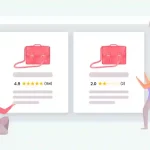How to tell if a survey company is a scam or legit
It is important to check out a market research company’s website for how they handle sensitive information like personal and financial data. It is also a good idea to review the list of clients they have worked with or testimonials on their site.
Survey scams can steal passwords and credit card details, install malware on your device and hijack your email account to commit fraud on a massive scale. Here’s how to tell if the company is legitimate or a scam.
Check the Company’s Reputation
Real survey companies make money by partnering with market research companies to gather data and then providing that information to the clients who pay for it. Fraudsters try to take advantage of this relationship by trying to profit directly from their participants. They will flood you with offers for huge sweepstakes (like a $2,000 Walmart gift card) or free samples and will ask for a lot of personal information that should never be shared on a survey site. These types of surveys can also lead to malware attacks and other security breaches that can be difficult to recover from.
Check the company website and search for its name on Google. If a site isn’t well-designed or there are spelling or grammatical errors, that’s a red flag. Legitimate survey sites will include an “about” page with the company’s history and contact information for participants to call if they have questions or concerns. SurveyLegend has both an About and Contact Us page to put people at ease about the legitimacy of our opportunities.
Check the Company’s Website
Any legitimate market research company will have a website and a transparent privacy policy. If you see any red flags, such as requests for payment or unrealistically large pay amounts, move on. It is also a good idea to check out the market research firm’s client list and testimonials. If they work with a variety of different organizations, it is likely that they are legitimate.
Another red flag to watch for is strange wording and misspellings. Legitimate surveys should be edited carefully, so they shouldn’t contain blatant mistakes like these. It’s also important to read through the company’s privacy policies and FAQs. If they don’t have any, that is a definite red flag. Scam survey companies will often sell your information to other marketers and use it for identity theft schemes. These Legit or `Scam Reviews can cost you thousands of dollars. So, always read through the company’s policies before you fill out a survey. It will save you a lot of time and money in the long run.
Check the Company’s Email Address
A common method of scamming gamers is through surveys that claim to provide free add-ons for their gaming experience. While this might seem harmless, scammers can use these surveys to install malware on your computer or mobile device and steal your personal information.
In addition, if you receive an email from a survey company that contains spelling or grammatical errors, it might be a red flag. Legitimate survey companies take the time to edit their emails and websites.
Scammers often promise large prizes, such as smartphones or tech gadgets, to lure participants into their surveys. However, legitimate survey companies are unlikely to give away such high-value items. Also, watch out for surveys that ask you to download attachments. These attachments are often malicious software that will collect your personal information and send it to bad actors. This could lead to identity theft and other serious consequences. You can check if a website is legitimate by looking for the padlock icon in the address bar of your browser.
Check the Company’s Payment Method
In most cases, legitimate paid survey companies will pay you by check. This is because checks are less likely to get into the wrong hands than electronic forms of payment. They also require a signature, making it harder to cash or deposit them without the proper ID.
It is also a red flag to be suspicious of any survey that asks you for sensitive information, such as your social security number, credit card number, or full address. Legitimate companies will not ask for this information unless you are a customer of their product or service.
Fraudsters can use this information to steal your identity or run up your credit card or other debt. They can also sell your information to other scammers or add you to more spam mailing lists. You can avoid these risks by avoiding unsolicited invitations via email or online ads and only participating in surveys that are offered through a reliable research panel or paid survey platform.










